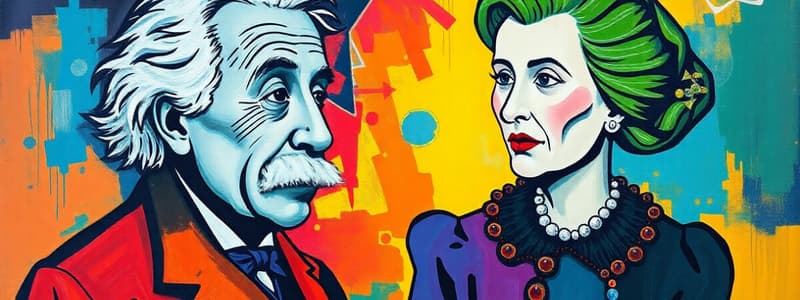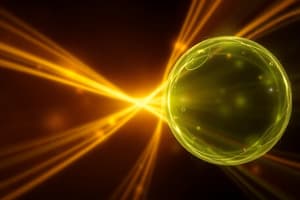Podcast
Questions and Answers
What year did Albert Einstein publish his doctoral thesis?
What year did Albert Einstein publish his doctoral thesis?
- 1905 (correct)
- 1955
- 1915
- 1902
Which notable award did Albert Einstein receive for his contributions to physics?
Which notable award did Albert Einstein receive for his contributions to physics?
- Fields Medal
- Wolf Prize
- Nobel Prize (correct)
- Crafoord Prize
What significant theory did Einstein publish in 1915?
What significant theory did Einstein publish in 1915?
- General Theory of Relativity (correct)
- Theory of Electromagnetism
- Theory of Quantum Mechanics
- Special Theory of Relativity
How did Einstein manage to work on his research while employed at the Swiss patent office?
How did Einstein manage to work on his research while employed at the Swiss patent office?
Which factor contributed to Einstein not securing a teaching post initially?
Which factor contributed to Einstein not securing a teaching post initially?
What unique approach did Einstein use in his early research to tackle complex problems?
What unique approach did Einstein use in his early research to tackle complex problems?
In what year did Einstein's ideas begin to gain wide recognition with four landmark papers?
In what year did Einstein's ideas begin to gain wide recognition with four landmark papers?
What effect did Einstein's theories have on the scientific community?
What effect did Einstein's theories have on the scientific community?
In which year did Marie Curie and Pierre Curie discover polonium and radium?
In which year did Marie Curie and Pierre Curie discover polonium and radium?
What prestigious award did Marie Curie receive in 1903?
What prestigious award did Marie Curie receive in 1903?
Who influenced Marie Curie's decision to research radioactivity?
Who influenced Marie Curie's decision to research radioactivity?
What was the primary focus of the Curies' research that led to their Nobel Prize?
What was the primary focus of the Curies' research that led to their Nobel Prize?
Which element did Marie Curie name after her native country?
Which element did Marie Curie name after her native country?
How did Marie Curie gain access to higher education in France?
How did Marie Curie gain access to higher education in France?
What field of study did the work of the Curies help to establish?
What field of study did the work of the Curies help to establish?
What was a notable aspect of Pierre Curie's collaboration with Marie Curie?
What was a notable aspect of Pierre Curie's collaboration with Marie Curie?
In which year did Rutherford win the Nobel Prize in Chemistry?
In which year did Rutherford win the Nobel Prize in Chemistry?
Who discovered radioactivity prior to Rutherford's research?
Who discovered radioactivity prior to Rutherford's research?
What significant discovery did Rutherford make about alpha radiation?
What significant discovery did Rutherford make about alpha radiation?
What process did Rutherford achieve by firing alpha particles at nitrogen atoms?
What process did Rutherford achieve by firing alpha particles at nitrogen atoms?
The Rutherford model of the atom proposed that electrons orbit around which component?
The Rutherford model of the atom proposed that electrons orbit around which component?
What was the name of the physicist with whom Rutherford worked at Cambridge University?
What was the name of the physicist with whom Rutherford worked at Cambridge University?
Which concept did Rutherford's experiments directly challenge regarding atomic structure?
Which concept did Rutherford's experiments directly challenge regarding atomic structure?
During which year did Rutherford propose the model of the atom that states electrons orbit a tiny nucleus?
During which year did Rutherford propose the model of the atom that states electrons orbit a tiny nucleus?
Flashcards
Questioning is important
Questioning is important
Einstein's belief that questioning and curiosity are essential for scientific progress.
What are Einstein's theories of relativity?
What are Einstein's theories of relativity?
The theories of relativity encompass special relativity (dealing with inertial frames and the speed of light) and general relativity (explaining gravity as a curvature of spacetime).
Einstein's influence on physics
Einstein's influence on physics
Einstein's impactful work revolutionized 20th-century physics and led to groundbreaking technologies.
Einstein's background
Einstein's background
Signup and view all the flashcards
Einstein's time at the patent office
Einstein's time at the patent office
Signup and view all the flashcards
Einstein's 'thought experiments'
Einstein's 'thought experiments'
Signup and view all the flashcards
Einstein's seminal papers
Einstein's seminal papers
Signup and view all the flashcards
Einstein's Nobel Prize
Einstein's Nobel Prize
Signup and view all the flashcards
Alpha and Beta Radiation
Alpha and Beta Radiation
Signup and view all the flashcards
Radioactive Decay
Radioactive Decay
Signup and view all the flashcards
Rutherford Model
Rutherford Model
Signup and view all the flashcards
Protons
Protons
Signup and view all the flashcards
Transmutation of Elements
Transmutation of Elements
Signup and view all the flashcards
Gold Foil Experiment
Gold Foil Experiment
Signup and view all the flashcards
Nuclear Fission
Nuclear Fission
Signup and view all the flashcards
Atom
Atom
Signup and view all the flashcards
What was Marie Curie's birth name?
What was Marie Curie's birth name?
Signup and view all the flashcards
What obstacle did Marie Curie face in pursuing her studies?
What obstacle did Marie Curie face in pursuing her studies?
Signup and view all the flashcards
What was Marie Curie's job before joining the Sorbonne?
What was Marie Curie's job before joining the Sorbonne?
Signup and view all the flashcards
Where did Marie Curie pursue her higher education?
Where did Marie Curie pursue her higher education?
Signup and view all the flashcards
What scientific field did Marie Curie pioneer?
What scientific field did Marie Curie pioneer?
Signup and view all the flashcards
What radioactive elements did Marie Curie discover?
What radioactive elements did Marie Curie discover?
Signup and view all the flashcards
What award did Marie Curie receive for her scientific achievements?
What award did Marie Curie receive for her scientific achievements?
Signup and view all the flashcards
How did Marie Curie's discoveries contribute to cancer treatment?
How did Marie Curie's discoveries contribute to cancer treatment?
Signup and view all the flashcards
Study Notes
Scientists Who Changed History
- The book is about notable scientists throughout history and their contributions.
- It features different scientists, including their backgrounds, discoveries, and lasting impact on their respective fields of study.
Santiago Ramón y Cajal
- Nobel Prize-winning neuroscientist.
- First to realize the nervous system is composed of independent cells communicating with each other.
- Modified Golgi's tissue-staining method to illuminate human brain tissue in 1888.
- Discredited the theory that nerve cells were continuous in 1888, demonstrating they are separate units.
- Wrote a book on nervous system structure in 1899.
- Jointly won the Nobel Prize with Golgi in 1906.
Max Planck
- German physicist.
- Developed quantum theory, which refuted the notion of continuous energy and fundamentally changed the understanding of the subatomic world.
- Worked on heat theory from 1885 to 1889, and later studied blackbody radiation and atomic vibration frequencies for decades.
- Presented his radiation distribution law incorporating energy quanta into physics in 1900, marking a breakthrough.
- Supported Einstein's Theory of Relativity in 1905.
- Won the Nobel Prize in Physics in 1919.
Nettie Stevens
- Early 20th-century US biologist.
- Conducted pioneering work on the discovery that sex determination is determined by chromosomes.
- Identified the X and Y chromosomes' role in sex determination in 1905.
- Published her discovery just before American geneticist Edmund Beecher Wilson.
George Washington Carver
- African American agricultural scientist and experimenter.
- Restored the Southern US economy by developing commercially viable products from crops (e.g., peanuts, sweet potatoes).
- Developed over 300 products from common crops.
- Worked to improve soil quality and crop cultivation, shifting the South from a reliance on cotton to diversified agriculture.
Thomas Hunt Morgan
- US geneticist and zoologist.
- Confirmed the role of chromosomes in heredity, building on Gregor Mendel's work.
- Founded the “Fly Room” at Columbia University in 1908 for breeding and studying fruit flies, a crucial step in understanding inheritable characteristics.
- Published a book outlining how heredity functions in 1915.
Marie Curie
- Polish-born female scientist.
- Pioneer in radioactivity research.
- Discovered two new radioactive elements: Polonium and Radium in 1898, and made crucial studies of the properties of these elements.
- Won the Nobel Prize in Physics for her research on radioactivity in 1903, which she shared with her husband and another scientist.
- Won a second Nobel Prize (in Chemistry in 1911).
- Isolated radium in 1910.
- Worked on radiotherapy, laying the groundwork for its use in cancer treatment.
Ernest Rutherford
- British physicist.
- Revolutionized atomic model; discovered alpha and beta radiation and nuclear fission.
- Discovered the atomic nucleus in 1919, proving that atoms were not indivisible.
António Egas Moniz
- Portuguese neurologist.
- Developed the first techniques of stereotactic surgery.
- Developed the procedure known as prefrontal lobotomy to treat mental diseases (including Schizophrenia, Depression, and Anxiety).
Lise Meitner
- Austrian physicist.
- Coined the term "nuclear fission" in 1938; and developed theories that explained the splitting of the uranium nucleus.
- Helped in the theoretical understanding of nuclear fission.
Albert Einstein
- German-born theoretical physicist.
- Developed the general and special theories of relativity, which fundamentally changed our understanding of space, time, and gravity
- Made groundbreaking contributions to the theory of relativity.
Alfred Wegener
- German meteorologist and polar explorer.
- Proposed the theory of continental drift.
- Presented evidence (e.g., similar fossils and rock formations on separated continents) to support his theory.
Marie Tharp
- American geologist and cartographer.
- Charted the ocean floor, including the mid-Atlantic rift, providing crucial evidence supporting the theory of continental drift
Sydney Brenner
- South African biologist.
- Pioneered research into developmental genetics.
- Helped to explain the genetic code for proteins, with Crick.
Tu Youyou
- Chinese pharmacologist.
- Isolated artemisinin, a highly effective antimalarial drug from traditional Chinese medicine.
Jane Goodall
- British primatologist.
- Extensive research on chimpanzee behavior, social structure, tool use, and more over a span of more than 50 years.
Valentina Tereshkova
- First woman cosmonaut.
- First civilian to fly in space.
Patricia Bath
- American ophthalmologist and inventor.
- Pioneer for women in ophthalmology.
- Developed the Laserphaco Probe for cataract surgery.
Stephen Hawking
- British theoretical physicist.
- Worked on black holes and the origin of the universe.
- Used mathematical models to explain concepts in physics, such as the singularity of the universe
James Watson
- US geneticist.
- Discovered the double-helix structure of DNA in 1953 with Francis Crick.
- Key figure in molecular biology.
Fred Sanger
- British biochemist.
- Developed the method to effectively sequence DNA, and proteins.
- Awarded two Nobel Prizes for his work on sequencing.
Jocelyn Bell Burnell
- British astronomer.
- Discovered pulsars in 1967.
Tak Wah Mak
- Immunologist and molecular biologist.
- Discovered the genetic encoding of human T-cell receptors.
Tim Berners-Lee
- British computer scientist.
- Invented the World Wide Web.
J.C.R. Licklider
- US computer scientist.
- Pioneered work on early internet concepts and architecture.
Other Scientists (Noteworthy but without specific details):
- Shiing-Shen Chern
- Satoshi Omura
- Murray Gell-Mann
- Henry Stommel
Studying That Suits You
Use AI to generate personalized quizzes and flashcards to suit your learning preferences.




